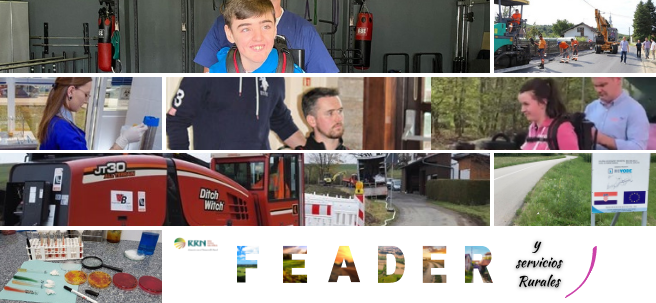
13 de May de 2021
May 13, 2021. Strengthening the socioeconomic fabric of rural areas is one of the general objectives of the Common Agricultural Policy (CAP). Thus, the three areas established by the EAFRD to guide the development of rural areas in Europe are: rural services, rural employment, and social inclusion.
- The European Agricultural Fund for Rural Development (EAFRD) presents several success stories in Europe in improving rural services.
- Infrastructure and basic services provide quality of life to the inhabitants of rural areas.
During the 2014-2020 period of the Common Agricultural Policy (CAP), the European Agricultural Fund for Rural Development (EAFRD) has achieved - through the Rural Development Programmes (RDP) - that various rural centres in Europe have achieved a good functioning of their services, which can be extrapolated to other rural populations that find themselves in similar situations.
FEADER success stories in rural services
The population in rural areas is typically more dispersed than in urban settlements, which often affects the economy of that population, making it less attractive to service providers.
When rural communities unite and work together around Rural Development Programs (RDPs), they can gain the strength needed to attract investment to their areas.
What improvements in rural services are there in Europe thanks to the EAFRD?
Bridging the digital divide (Germany)
Kassel, Schwalm-Eder, Waldeck-Frankenberg, Werra-Meissner, and Hersfeld-Rotenburg are five sparsely populated rural districts in the northern Hesse region of central Germany. The five municipalities joined forces to build a local fiber optic cable company by applying for funding from the RDP in their respective areas.
This project earned them the " European Broadband Award " in 2015, but above all, it has enabled them to connect more than 570 villages in 90 municipalities in the northern Hesse region to the internet today. In fact, the company has developed a "Gigabit Strategy " to help surrounding municipalities also obtain high-speed internet.
Improving water supply (Croatia)
Reka is a small rural settlement of around 1,500 inhabitants in Koprivnica-Križevci County, in northern Croatia. The municipality decided on its own initiative to complete the public water supply and sewage system, built in 1997, as 50 of Reka's 500 households still lacked access to it.
After applying for funding from the RDP, the public company built 2.3 kilometers of sewer lines , providing access to homes without water. And all this without causing disruption to the construction work, as residents were able to reach agreements with the company to negotiate each connection in a timely manner.
The project also paved the way for improvements to the road connecting two villages in the county through which water pipelines run, adding a bike path and playgrounds to the surrounding area.
Door-to-door mobile veterinary service (Romania)
Veterinary health services are very important for entities that raise animals and market animal products, most of which are located in rural areas.
The private company Laborvet began operating in 2009, providing veterinary services in Bacau County, Romania. This private veterinary company used funding from the RDP to better meet the needs of its clients and expand its activities. Thanks to this funding, the company acquired a mobile veterinary laboratory for treating farm animals and pets. It was then able to hire three people from the region, expanding its workforce.
This door-to-door service saves farms time and money and has enabled local job creation.
Special rehabilitation in inaccessible areas (Ireland)
EAFRD funding has given new hope to patients suffering from stroke or spinal cord injuries in rural Ireland, making neurological rehabilitation more inclusive for local communities.
The No Barriers Foundation , based in Letterkenny, Co. Donegal, Ireland, is offering patients in rural areas the opportunity to follow rehabilitation protocols in their own community through the purchase of a robotic exoskeleton funded by Donegal's LEADER funds. This "rural exoskeleton" is one of only three publicly accessible in Ireland and one of only 300 non-private exoskeletons worldwide.
The No Barriers Foundation offers its services at a price of €30-60 per session, with the added benefit of allowing rural patients to continue rehabilitation close to home.
If you would like more information about FEADER success stories in Europe, you can find it here .










